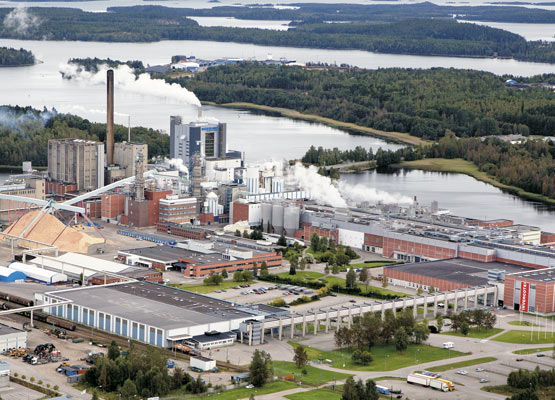New recycling recommendations help climate efforts
/ins In the UK new recommendations allow paperboard packaging to contain up to 15 per cent plastic and still be considered recyclable. One item of such packaging can have 80 per cent less climate impact compared with the corresponding all-plastic packaging.
Paperboard packaging with a thin plastic barrier is an ideal compromise which combines paperboard’s stiffness for the construction with plastic’s impermeability for such purposes as a longer food lifespan. This type of packaging reduces the use of plastic and has far less climate impact than the equivalent packaging made only of plastic.
However, opinion has been divided over whether and how this type of packaging can be recycled. The answer depends mainly on which technology is available in each local market. This has been the case in the UK, which has lacked clear advice on how packaging made of such combination materials should be recycled.
Plastic-coated paperboard
At the beginning of 2020, the UK labelling organisation OPRL (On-Pack Recycling Label) issued guidelines for how to recycle packaging made of paper and board with a plastic coating. The guidelines were developed in cooperation with the relevant industry organisations and specify which recycling label should be put on the packaging to advise consumers.
The new recommendations state that packaging can contain up to 15 per cent plastic and still be classified as recyclable and be sorted in the waste stream for paper materials. As of January 2023 the permitted plastic content will be reduced to 10 per cent of the packaging’s weight.
Gives time for development
“This is a good decision which establishes clear rules for a number of years ahead,” comments Ginny Samuel, Business Development Manager at Iggesund Paperboard. “Those of us who work with paper- and paperboard-based packaging have been challenged to develop solutions using less material but we’ve also been given time to do this.”
OPRL originally wanted to allow far less than 15 per cent plastic content in fibre-based packaging. But increasing awareness of packaging’s climate impact has already persuaded numerous major brand owners to start replacing their all-plastic solutions. This is particularly the case with food packaging, where plastic is often necessary as a barrier against moisture, grease or aroma. Setting the limit for plastic content too low would have risked slowing down this development.
“One solution that’s very common in food packaging is to put the food in a tray, and plastic is most commonly used for this,” explains Jonas Adler, Director New Business Development at Iggesund Paperboard. “We can replace it with our combination material Inverform, which is a paperboard tray with a thin plastic barrier. But it currently has a plastic content of over 10 per cent.
“Our solution reduces the packaging’s climate impact by 80 per cent, so it would be a setback for sustainability work if this packaging solution were to be penalised.”
Significant reduction
The goal of the paper and board industry is to reduce and eventually eliminate the use of plastic in this type of product – a step that requires new, fossil-free barriers. Development work is being done in many places, and new and increasingly better solutions will undoubtedly be presented in within the next few years.
OPRL’s guidelines are primarily intended for the UK market, and the question is how much will they influence other markets?
“They will also be significant outside the UK,” Jonas Adler replies. “Because so many strong brands are based there, these guidelines will definitely have an impact outside the British Isles.”
Adapting facilities
Jonas Adler also emphasises that material manufacturers cannot bear all the responsibility for closing the recycling circle.
“The recycling systems and their facilities must also be developed so that they can handle the new, resource-efficient material solutions. OPRL’s recommendation gives both them and the material producers time to adapt, and thereby creates the conditions to make the packaging industry even more circular.”
Caption: Plastic trays are common applications in food packaging. By changing to paperboard and a plastic barrier the climate impact is significantly lowered whilst the package is still recyclable.
Iggesund
Iggesund Paperboard is part of the Swedish forest industry group Holmen, one of the world’s 100 most sustainable companies listed on the United Nations Global Compact Index. Iggesund’s turnover is just over €500 million and its flagship product Invercote is sold in more than 100 countries. The company has two brand families, Invercote and Incada, both positioned at the high end of their respective segments. Since 2010 Iggesund has invested more than €380 million to increase its energy efficiency and reduce the fossil emissions from its production.
Iggesund and the Holmen Group report all their fossil carbon emissions to the Carbon Disclosure Project. The environmental data form an integral part of an annual report that complies with the Global Reporting Initiative’s highest level of sustainability reporting. Iggesund was founded as an iron mill in 1685, but has been making paperboard for more than 50 years. The two mills, in northern Sweden and northern England employ 1500 people.
Further information:
Iggesund Paperboard
Therese Rahm, Communication Manager,
Iggesund Paperboard, +46 70 595 56 10,
Jonas Adler
Director New Business Development
+46 70 351 85 00












Let us know if you are going to use this press release. Thank you!